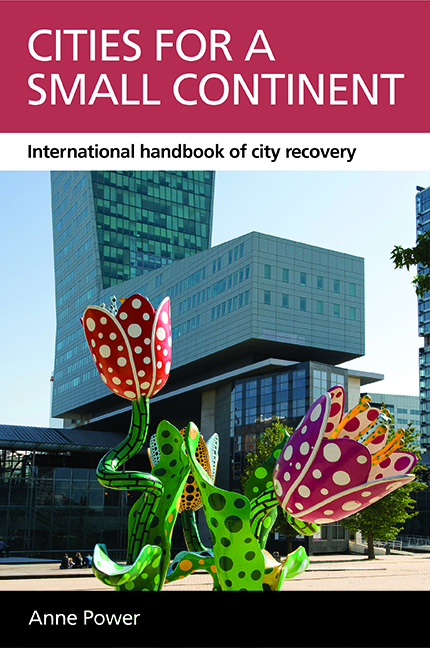Book contents
- Frontmatter
- Contents
- List of tables and figures
- Abbreviations and acronyms
- Acknowledgements
- Copyright material
- Foreword
- one Lessons from cities in a crowded continent Tale of a city – Bilbao
- two Divided and united Europe Tale of a city – Belfast
- three Grit and vision Tale of a city – Sheffield
- four Struggle and strive Tale of a city – Lille
- five Threats and opportunities Tale of a city – St Étienne
- six Over-scale and under-scale Tale of a city – Torino
- seven The power of social innovation Tale of a city – Leipzig
- eight Shoots of growth in older industrial cities in the US Tale of a city – Detroit
- nine Finding new ways out of the woods
- Endnotes
- References
- Afterword
- La Fabrique de la Cité
- Index
four - Struggle and strive Tale of a city – Lille
Published online by Cambridge University Press: 01 September 2022
- Frontmatter
- Contents
- List of tables and figures
- Abbreviations and acronyms
- Acknowledgements
- Copyright material
- Foreword
- one Lessons from cities in a crowded continent Tale of a city – Bilbao
- two Divided and united Europe Tale of a city – Belfast
- three Grit and vision Tale of a city – Sheffield
- four Struggle and strive Tale of a city – Lille
- five Threats and opportunities Tale of a city – St Étienne
- six Over-scale and under-scale Tale of a city – Torino
- seven The power of social innovation Tale of a city – Leipzig
- eight Shoots of growth in older industrial cities in the US Tale of a city – Detroit
- nine Finding new ways out of the woods
- Endnotes
- References
- Afterword
- La Fabrique de la Cité
- Index
Summary
All living things must take from nature in order to survive based on renewal and regeneration. But it does mean the end of the extractivist mind-set, of taking without caretaking
Naomi Klein, This Changes EverythingBox 4.1: Lille – a story
Eurostar, connecting London, Paris and Bruxelles by train through the Channel Tunnel, makes a hasty stop at Euralille, the super-modern station surrounded by futuristic office blocks representing the new Lille. The outsized new square visitors have to cross to reach the city centre looks underpeopled and underused. Yet on foot it is only a few minutes to the heart of medieval Lille, lovingly restored and heavily zig-zagged with red city bicycles. In the great medieval central square, cafes spill out onto the pavements. On one corner sits a Paul's bakery, a popular, specialist French bread chain that has spread all over France and southern England, from its early beginnings as a family enterprise in Lille. A strong Catholic tradition in Lille of investing in family businesses in the city generates jobs and wealth for the city, always industrious and struggling, somewhat of an ugly sister in urban France.
Lille wears its past well. A small, charming hotel near the centre is converted out of an ancient monastic refuge for destitute people. Its original cells now make quaint bedrooms. Its preserved chapel reminds guests of a dedicated past.
Euratechnologie, based in the giant converted textile mill on the edge of the river and canal that create a protective island around the old city, is another emblem of ancient and modern Lille. There are at least four oversized brick built textile mills on the site, monuments to the huge industry of specialist linen production that Lille was famous for. Lille's linen was coarse, unrefined and especially useful for many commercial, agricultural and industrial purposes. Today, Euratechnologie is at the cutting edge of the digital revolution with over 200 companies, many international, based there. It also houses many start-ups.
The historic neighbourhood around the mills is unique – terraced Flemish weavers’ houses, a reminder of Lille's divided history, part Flanders, part France, sometimes occupied by Spain, Austria or Germany.
- Type
- Chapter
- Information
- Cities for a Small ContinentInternational Handbook of City Recovery, pp. 93 - 134Publisher: Bristol University PressPrint publication year: 2016



